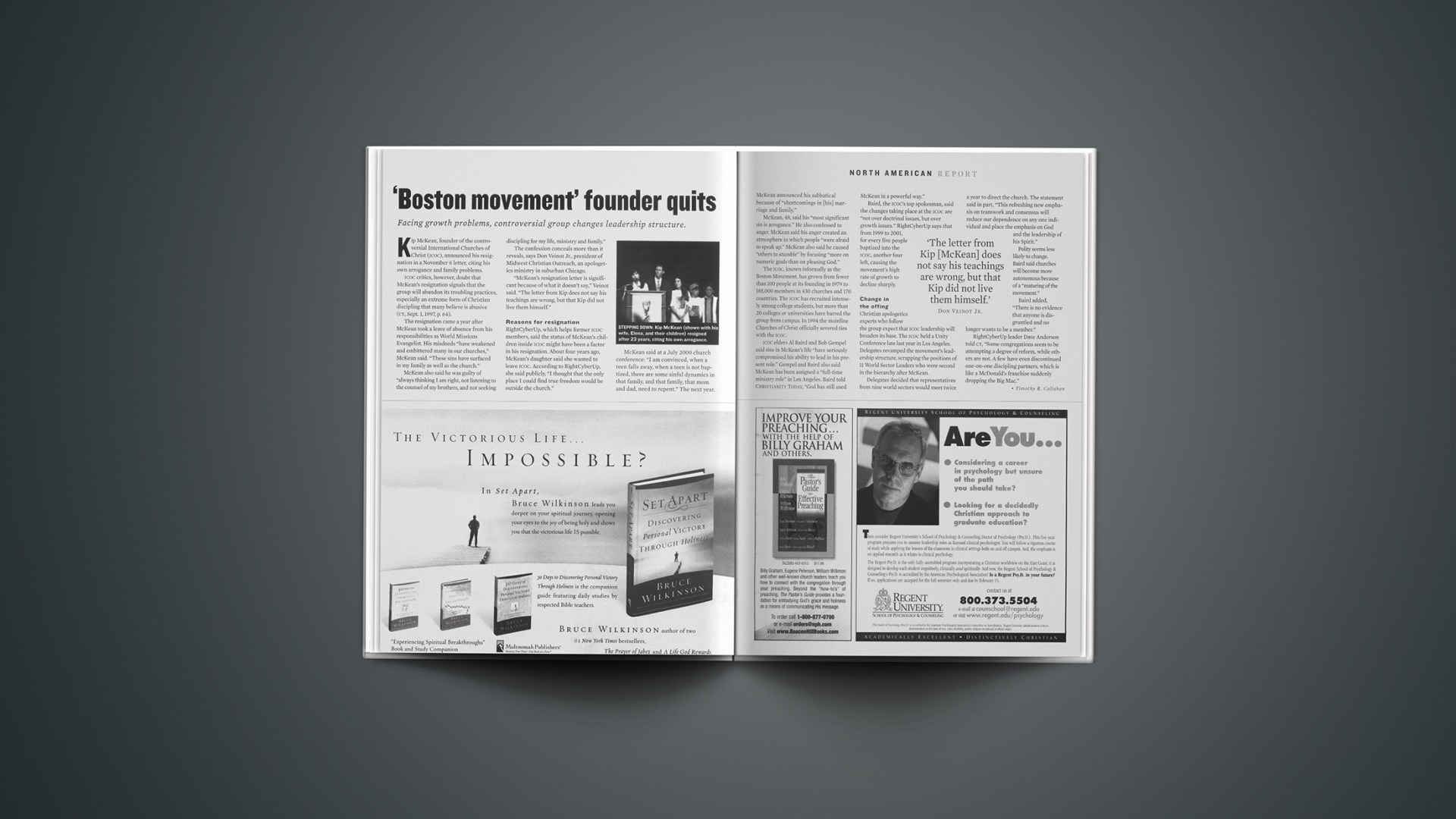Kip McKean, founder of the controversial International Churches of Christ (icoc), announced his resignation in a November 6 letter, citing his own arrogance and family problems.
ICOC critics, however, doubt that McKean’s resignation signals that the group will abandon its troubling practices, especially an extreme form of Christian discipling that many believe is abusive (CT, Sept. 1, 1997, p. 64).
The resignation came a year after McKean took a leave of absence from his responsibilities as World Missions
Evangelist. His misdeeds “have weakened and embittered many in our churches,” McKean said. “These sins have surfaced in my family as well as the church.”
McKean also said he was guilty of “always thinking I am right, not listening to the counsel of my brothers, and not seeking discipling for my life, ministry and family.”
The confession conceals more than it reveals, says Don Veinot Jr., president of Midwest Christian Outreach, an apologetics ministry in suburban Chicago.
“McKean’s resignation letter is significant because of what it doesn’t say,” Veinot said. “The letter from Kip does not say his teachings are wrong, but that Kip did not live them himself.”
Reasons for resignation
RightCyberUp, which helps former icoc members, said the status of McKean’s children inside icoc might have been a factor in his resignation. About four years ago, McKean’s daughter said she wanted to leave ICOC. According to RightCyberUp, she said publicly, “I thought that the only place I could find true freedom would be outside the church.”
McKean said at a July 2000 church conference: “I am convinced, when a teen falls away, when a teen is not baptized, there are some sinful dynamics in that family, and that family, that mom and dad, need to repent.” The next year, McKean announced his sabbatical because of “shortcomings in [his] marriage and family.”
McKean, 48, said his “most significant sin is arrogance.” He also confessed to anger. McKean said his anger created an atmosphere in which people “were afraid to speak up.” McKean also said he caused “others to stumble” by focusing “more on numeric goals than on pleasing God.”
The icoc, known informally as the Boston Movement, has grown from fewer than 100 people at its founding in 1979 to 185,000 members in 430 churches and 170 countries. The ICOC has recruited intensely among college students, but more than 20 colleges or universities have barred the group from campus. In 1994 the mainline Churches of Christ officially severed ties with the icoc.
icoc elders Al Baird and Bob Gempel said sins in McKean’s life “have seriously compromised his ability to lead in his present role.” Gempel and Baird also said McKean has been assigned a “full-time ministry role” in Los Angeles. Baird told Christianity Today, “God has still used McKean in a powerful way.”
Baird, the icoc’s top spokesman, said the changes taking place at the icoc are “not over doctrinal issues, but over growth issues.” RightCyberUp says that from 1999 to 2001, for every five people baptized into the icoc, another four left, causing the movement’s high rate of growth to decline sharply.
Change in the offing
Christian apologetics experts who follow the group expect that icoc leadership will broaden its base. The ICOC held a Unity Conference late last year in Los Angeles. Delegates revamped the movement’s leadership structure, scrapping the positions of 11 World Sector Leaders who were second in the hierarchy after McKean.
Delegates decided that representatives from nine world sectors would meet twice a year to direct the church. The statement said in part, “This refreshing new emphasis on teamwork and consensus will reduce our dependence on any one individual and place the emphasis on God and the leadership of his Spirit.”
Polity seems less likely to change.
Baird said churches will become more autonomous because of a “maturing of the movement.”
Baird added, “There is no evidence that anyone is disgruntled and no longer wants to be a member.”
RightCyberUp leader Dave Anderson told CT, “Some congregations seem to be attempting a degree of reform, while others are not. A few have even discontinued one-on-one discipling partners, which is like a McDonald’s franchise suddenly dropping the Big Mac.”
Copyright © 2003 Christianity Today. Click for reprint information.
Related Elsewhere
Previous Christianity Today articles on the International Churches of Christ include:
The Cost of Discipleship? | Despite allegations of abuse of authority, the International Churches of Christ expands rapidly. (Sept. 1, 1997)
The official website of The International Churches of Christ has posted Kip McKean’s resignation letter and a response from its elders.
Other coverage includes:
Kip McKean resigns as leader of the International Churches Of Christ—The Watchman Expositor
Kip McKean resigns as head of ICOC—The Christian Chronicle (Dec. 17, 2002)
The Watchman Expositor online site has a profile of International Churches of Christ.










